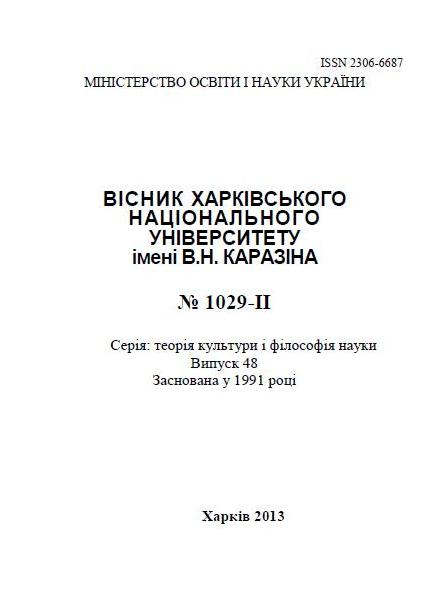СМЕРТЬ ЯК «ВОРОГ»; СМЕРТЬ ЯК «ПОВЕРНЕННЯ» (ТАНАТОЛОГІЧНА ПРОБЛЕМАТИКА У АНДРІЯ ПЛАТОНОВА)
Abstract
Аналізується танатологічна проблематика російського письменника А. Платонова у
рамках його філософсько-антропологічних поглядів, пов’язаних з осмисленням людського
буття, тілесності та духовності.
Бороденко О. В. СМЕРТЬ КАК «ВРАГ»; СМЕРТЬ КАК «ВОЗВРАЩЕНИЕ»
(ТАНАТОЛОГИЧЕСКАЯ ПРОБЛЕМАТИКА У АНДРЕЯ ПЛАТОНОВА) Анализируется
танатологическая проблематика Андрея Платонова в рамках его философско-
антропологических взглядов, связанных с осмыслением человеческого бытия ,
телесности и духовности.
Ключевые слова: смерть, умирание, экзистенциальная символика, миропереживание,
духовность, телесность, человеческое бытие.
Borodenko O.V. A DEATH LIKE «ENEMY»; A DEATH LIKE «RETURN»
(THANATHOLOGIC PROBLEMS IN ANDREI PLATONOV’S WORKS) Analysis of
interpretation the thanathologic problems by Andrei Platonov like a part of his philosophical
anthropologic opinions. The study to existential symbolism in the philosophical anthropologic
opinions of prose by Andrei Platonov occupies a central place of investigation in this article.
The point at issue in this cause is sense and destination of human in philosophical ideas by
Andrei Platonov (1899-1951), the Russian writer, author of many interesting and important
works. In recent years, researches have become increasingly interested in philosophical
problems of human fleshliness, death and dying, symbolism of human being. Many recent studies
have focused on interpretation these moments of Post-modernist philosophy (death of subject,
symbolism of death, outliving process with his periods too).
Death is life's ending for science conseptions. Let us say that vital processes are those by
which organisms develop or maintain themselves. These processes include chemosynthesis,
photosynthesis, cellular respiration, cell generation, and maintenance of homeostasis.
Then death is the ending of the vital processes by which an organism sustains itself. However,
life's ending is one thing, and the condition of having life over is another. ‘Death’ can refer to
either. Thus death can be a state (being dead), the process of extinction (dying), or one of three
events that occur during the dying process. Death in all of these senses can be further
distinguished from events—such as being shot with an arrow—that cause death.
Although considerable amount of research has been devoted to anthropologic aspects of
onthology problems in A.Platonov’s creation, few attempts have been made to investigate the
connection between conceptions by A.Platonov and Russian religion philosophy.
My results coincide with opinions by M.Geller, L.Shubin, S.Semenova, S.Bocharov and other
specialists. They regard what conception by A.Platonov emerged from N.Fedorov’s work “The
Philosophy of Common Affair”. Fedorov assessed the life of mankind like a mutual hostility and
enmity. The people must be consolidated on the basis of equality and the understanding of blood
relationship. All the generations must be consolidated to one in perspective for defense of death.
The problems of death and dying are part of human being problems have many different senses
and interpretations. The thanathologic problems by Andrei Platonov touch on questions of
human fleshliness like the part of mashinary, the part of industrial encirclement, the problems of
human desomatization.
Key words: death, dying, existential symbolism, outliving, spirituality, fleshliness, human
being.




